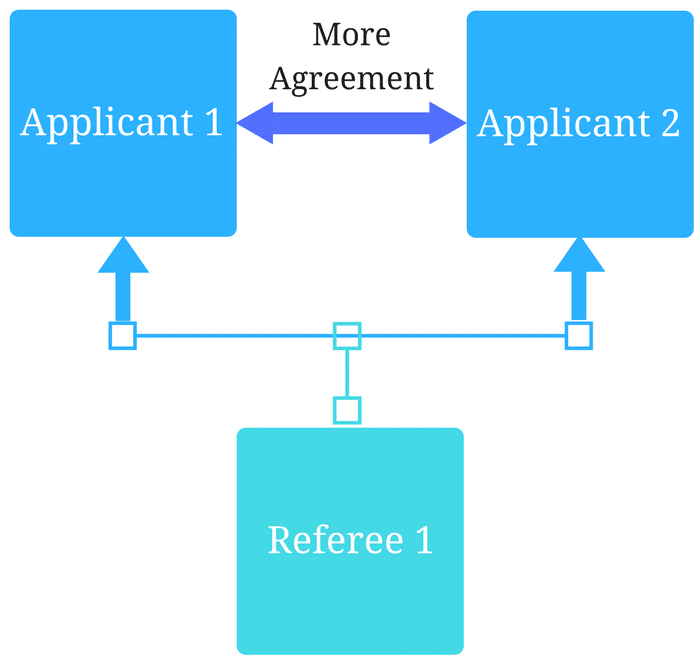Using One45 by Acuity Insights to Improve LCME Accreditation Outcomes

June 12, 2025
In today’s high-stakes medical-education landscape, schools must manage vast streams of performance and compliance data to satisfy ever-evolving LCME accreditation requirements.
Sustaining and enhancing your institution’s LCME accreditation outcomes depends on uncovering actionable insights from performance and compliance data, pinpointing areas for improvement, and converting those findings into targeted action.
Let’s explore how Acuity Insights’ solutions can help medical schools improve LCME accreditation outcomes.
Continuous Quality Improvement (CQI)
The LCME requires schools to conduct ongoing monitoring between site visits, to ensure they meet accreditation standards.
The very first standard states this requirement:
“Standard 1.1 Strategic Planning and Continuous Quality Improvement
A medical school engages in ongoing strategic planning and continuous quality improvement processes that establish its short and long-term programmatic goals, result in the achievement of measurable outcomes that are used to improve educational program quality, and ensure effective monitoring of the medical education program’s compliance with accreditation standards.”
Achieving Standard 1.1 demands a comprehensive, data-driven approach. You must define clear objectives for continuous quality improvement, map how and where each type of data – student performance metrics, clinical logs, exam results, program evaluations – is captured, and establish robust tracking mechanisms to measure progress against those objectives. Equally important is a transparent process for sharing insights with faculty, administrators, and other stakeholders.
With disparate data scattered across multiple systems, the real work lies in integrating and interpreting that information to identify emerging issues, course-correct as needed, and document every action step. By embedding this cycle of planning, measurement, and adjustment into your accreditation strategy, you’ll enter your next LCME review with evidence of sustained improvement and the confidence that comes from clear, actionable data.
Enabling holistic admissions
To satisfy LCME standards on admissions, your admissions process must go beyond transcripts and test scores, in order to capture the personal and professional attributes that predict success in medicine. With Acuity’s admissions assessment suite, you can:
- Demonstrate their capacity for recruiting learners who possess the intelligence, professionalism, and emotional characteristics to excel as healthcare providers.
- Define mission-aligned qualities. Articulate the values and competencies—ethical judgment, teamwork, resilience—that your faculty prizes, then build scenario-based evaluations to surface how candidates apply those qualities in realistic contexts.
By embedding these capabilities into your workflow, you’ll demonstrate to the LCME that your admissions decisions are data-driven, transparent, and tightly aligned with your school’s defined mission. That will enable you to satisfy LCME elements
- 10.2 Final Authority of Admissions Committee
- 10.4 Characteristics of Accepted Applicants
- 10.9 Student Assignment
Collecting Performance and Assessment Data
Effective quality improvement begins with clear insight into how learners and faculty are performing – and that means more than just grades and feedback forms. Accreditors look for evidence that feedback is not only provided promptly but is rich enough to drive meaningful change. By establishing transparent, continuous feedback loops, your program can identify strengths and gaps early, support targeted remediation, and demonstrate to the LCME that your assessment ecosystem truly informs learning.
To action this in your program, One45’s program management modules enable you to:
- Provide Timely Feedback. Ensure that teaching staff receive timely and meaningful feedback, and learners are assessed and graded promptly with tools that capture data in real time, and released in alignment with accreditation requirements.
- Capture rich narrative insights. Embed structured narrative fields in every assessment form – clinical evaluations, OSCEs, workplace-based assessments – so qualitative observations accompany numeric scores.
- Enable competency tracking. Leverage our CBME module to record Entrustable Professional Activities (EPAs) and other competency milestones. Learners and coaches can monitor progression over time via a centralized dashboard, ensuring early identification of performance gaps.
- Streamline grading workflows. Consolidate scores from multiple evaluators, apply standardized rubrics, and release final grades in one click, guaranteeing clarity and consistency for students.
With our Assessment, and Evaluation, Grades, and CBME tools integrated within One45’s Scheduling framework, you’ll generate the documentation and reports needed to demonstrate compliance with these LCME standards:
- 4.4 Feedback to Faculty
- 8.5 Medical Student Feedback
- 9.4 Assessment System
- 9.5 Narrative Assessment
- 9.7 Formative Assessment and Feedback
- 9.8 Fair and Timely Summative Assessment
- 9.9 Student Advancement and Appeal Process
Documenting Clinical Experiences
Building on your assessment framework, the next critical piece is capturing learners’ real-world clinical exposure. Accrediting bodies require concrete evidence that students encounter the full spectrum of patient diagnoses and procedures—and that any shortfalls are identified and remediated early. By weaving clinical-experience tracking into your continuous quality-improvement cycle, you’ll turn disparate logs into actionable insights.
One45 streamlines this process by:
- Centralizing encounter logs. Aggregate duty-hour records, patient diagnosis and procedure counts, and site-specific student and faculty evaluations into one intuitive dashboard.
- Automating gap alerts. Configure threshold-based notifications when learners fall short of required encounters or exceed duty-hour limits, so program leaders can intervene in real time.
- Ensuring comparability across sites. Standardize logging formats and evaluation criteria for multiple clerkship locations, enabling fair cross-site comparisons and quality monitoring.
- Supporting longitudinal clerkships. Track learner progression over extended clinical rotations, generating reports that feed directly into your CQI cycle.
By leveraging Clinical Experience Logs, Duty-Hour Tracking, and consolidated reporting in One45, you’ll provide the evidence and insights needed to satisfy these LCME standards:
- 5.5 Resources for Clinical Instruction
- 6.1 Program and Learning Objectives
- 6.2 Required Clinical Experiences
- 6.3 Self-Directed and Life-Long Learning
- 6.4 Inpatient/Outpatient Experiences
- 6.5 Elective Opportunities
- 8.6 Monitoring of Completion of Required Clinical Experiences
- 8.7 Comparability of Education/Assessment
- 8.8 Monitoring Student Time
Understanding Your Curriculum
Once you’ve captured learner performance and clinical encounters, the next critical step is understanding exactly what—and when—they’re being taught. Effective curriculum management is the backbone of your CQI cycle and essential for LCME compliance. One45’s curriculum mapping module serves as your single source of truth—making it easy to see where each competency is delivered, spot gaps or overlaps instantly, and feed those insights back into continuous program improvement.
Our One45 Curriculum Management software solution enables you to:
- Centralize your curriculum. Store every course, session, and learning objective in one repository, ensuring you always know how and when objectives are addressed.
- Uncover gaps and redundancies. Run instant reports to identify missing content or unnecessary repetition, then adjust your sequence or add new experiences to strengthen your program.
- Align objectives with outcomes. Map program-level objectives directly to individual sessions and assessments—streamlining both LCME reporting and your CQI planning.
- Enhance stakeholder visibility. Share dynamic dashboards with faculty and administrators so everyone stays aligned.
These capabilities directly support LCME elements on curriculum design and oversight:
- 6.1 Program and Learning Objectives
- 6.3 Self-Directed and Life-Long Learning
- Standard 7 and its sub-elements
- 8.1 Curricular Management
- 8.2 Use of Medical Educational Program Objectives
- 8.4 Evaluation of Educational Program Outcomes
- 8.5 Medical Student Feedback
- 8.8 Monitoring Student Time
Recording Schedule Data
With curriculum mapped, performance tracked, and clinical experiences logged, the next critical component is proving that learners are placed—and progressing—in the right rotations. Accurate documentation of rotation schedules powers your CQI cycle by revealing gaps, optimizing exposure, and generating the audit trail LCME requires. One45’s Scheduling module makes this easy by centralizing assignment (rotations) management and automating distribution, tracking, and reporting.
One45 enables you to:
- Centralize rotation scheduling. Build and adjust clinical and didactic schedules in a single system, ensuring every learner and instructor has up-to-date assignment details.
- Automate objective distribution. Publish program and rotation goals directly to learners’ and faculty eDossiers as digital handouts—no more manual emailing or paper packets.
- Track acknowledgement and engagement. Monitor who has viewed each handout and require digital “sign-off” to confirm receipt and understanding.
- Produce compliance reports. Generate timestamped logs showing distribution, viewing, and acknowledgement rates—creating an audit trail that satisfies accreditor inquiries.
These capabilities support compliance with the following LCME standards:
- 9.1 Preparation of Resident and Non-Faculty Instructors
- 10.9 Student Assignment
Supporting Student Affairs Operations
Once you’ve mapped curriculum, tracked performance, and documented clinical placements and assignments, the next step is equipping your Student Affairs team to turn all that data into proactive learner support. Robust advising, career guidance, and transparent record-keeping depend on giving advisors a unified view of each student’s journey, from preclinical course grades and exam results to clinical assessments and procedure logs. Our Analytics solution with its native integration into One45 delivers exactly that, so your advisors can intervene early, personalize support, and demonstrate LCME-compliant protocols with confidence.
- Unified learner profiles. Pull together performance metrics, assessment feedback, clinical evaluations, and scheduling history into a single, searchable record, eliminating data silos and empowering advisors with the full picture.
- Customizable insight dashboards. Build role-based dashboards that surface key indicators—at-risk students, milestone completion, residency application progress, so advisors can identify trends and intervene early.
- Automated MSPE preparation. Leverage pre-populated templates fed by each learner’s activity log and performance data, then generate and distribute the Medical Student Performance Evaluation with just a few clicks.
- Secure record access & audit trails. Grant learners and faculty controlled access to their own eDossier records, track every view or download, and produce timestamped logs to demonstrate compliance with records-access standards.
By embedding these capabilities into your student affairs workflows, you’ll provide documented evidence of robust advising protocols and seamless support services, directly addressing these LCME elements:
- 11.1 Academic Advising and Academic Counselling
- 11.2 Career Advising
- 11.4 Provision of MSPE
- 11.6 Student Access to Educational Records
Harnessing One45 and Analytics in this way ensures your school not only meets accreditation benchmarks but delivers a personalized, data-driven support experience that helps every learner succeed.
Looking Ahead: Your Next Steps Toward Accreditation Success
As you prepare for your 2025–26 LCME review, be sure to consult the full set of LCME Accreditation Standards and supporting documents. You can download the official 2025–26 requirements and checklists directly from the LCME website: Standards, Publications, & Notification Forms.
While this post has focused on how the solution set from Acuity Insights streamlines compliance with key LCME elements to improve LCME accreditation outcomes, it’s important to note that Canadian schools will undergo a major change effective July 1, 2025. At that point, the Committee on Accreditation of Canadian Medical Schools (CACMS) will assume sole responsibility for MD-degree accreditation in Canada. Read our blog post titled CACMS vs LCME Standard – Where Do They Diverge?
By aligning your processes with both LCME expectations and the powerful capabilities of the full Acuity Insights product suite, you’ll walk into your next accreditation review with confidence, clarity, and a robust record of sustained improvement.
Ready to see how One45 can transform your accreditation journey? Contact our team to request a demo and learn more.
Case study: How One45 by Acuity Insights strengthens medical college of Georgia’s LCME accreditation.
Related Articles

How interviews could be misleading your admissions...
Most schools consider the interview an important portion of their admissions process, hence a considerable…
Reference letters in academic admissions: useful o...
Because of the lack of innovation, there are often few opportunities to examine current legacy…
